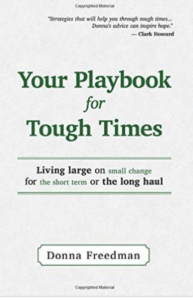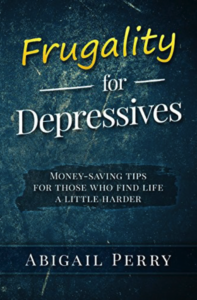Updated to add second coupon code. I mentioned earlier this week that I’m giving away a copy of Donna Freedman’s “Playbook for Tough Times,” as well as Abigail Perry’s “Frugality for Depressives.” (Donna and Abby are mother and daughter.)
Donna just let me know that she’s also offering a short-term discount on the PDF version of “Playbook.” If you don’t win the giveaway, you can get the e-book for $5 through Nov. 30 by using the discount code ASKLIZ at this payment link:
https://www.e-junkie.com/ecom/
Abby’s offering a $1.99 discount on her book as well. Use the code FRUGALITY to get the book for $5 through Nov. 30:
Visit https://www.e-junkie.com/ecom/gb.php?c=cart&ejc=2&cl=315870&i=1517519
You can enter to win the books by leaving a comment here on my blog (not my Facebook page). Make sure to include your email address, which won’t show up with your comment, but I’ll be able to see it.
 Comments are moderated, so it may take a little while for your comment to show up.
Comments are moderated, so it may take a little while for your comment to show up.
The winners will be chosen at random Friday night. Over the weekend, please check your email (including your spam filter). If I don’t hear from a winner by noon Pacific time on Monday, his or her prize will be forfeited and I’ll pick another winner.
Also, check back here often for other giveaways.
The deadline to enter is midnight Pacific time on Friday. So–comment away!
 Today’s top story: NerdWallet’s best credit card tips for November. Also in the news: How credit card rewards can help pay for the holidays, what to do if your parents don’t have a retirement plan, and the pros and cons of a joint checking account with your parents.
Today’s top story: NerdWallet’s best credit card tips for November. Also in the news: How credit card rewards can help pay for the holidays, what to do if your parents don’t have a retirement plan, and the pros and cons of a joint checking account with your parents.
 Today’s top story: Why minimum payments on credit cards are designed to keep you in debt. Also in the news: Retirement planning rules Millennials can break, how to choose the right health insurance plan “metal tier,” and why it’s so hard to stick to a budget.
Today’s top story: Why minimum payments on credit cards are designed to keep you in debt. Also in the news: Retirement planning rules Millennials can break, how to choose the right health insurance plan “metal tier,” and why it’s so hard to stick to a budget.